- Home
- Rose Tremain
Restoration Page 13
Restoration Read online
Page 13
"Merivel," she said in a whisper of great urgency, "come down. Your bird is dying."
"My nightingale?"
"Yes. You are a physician. It will die if something is not done."
I did not know what time it could be, for I had forgotten to wind my timepiece (if I had been the King, I would have had a diversity of clocks to choose from). I knew only that it was the very middle of the night and so cold that I could see my breath by the light of the candle.
Having given her message, Celia fled from my room, taking the candle with her so that I was left in utter darkness. As I struggled to light a lamp, find my wig and my stockings and wrench a blanket from the bed in which to wrap myself, I wondered why in the world Celia had been looking at my bird at this peculiar hour-she who, with the griping Farthingale, habitually retired to her room no later than nine o'clock. I was more puzzled by this than filled with worry for my bird, until that is I reached my Withdrawing Room at last and saw the poor thing.
Celia had placed the cage on the carpet in front of a fire upon which new logs had been laid. I knelt down.
"Look," said Celia. "It has fallen over."
It was lying on the floor of the cage, its legs in the air, one wing feebly flapping.
"What is to be done, Merivel?"
I looked up at Celia. I had detected in her voice a note of great sadness, of despair even. I was so utterly astonished that she should appear to care so much for something that, I, too, cared about that I was speechless, thus causing her to say once more:
"Merivel, what is to be done?"
I looked again at the nightingale. Its marigold eye, usually such a bright thing, appeared clouded, almost as if a membrane obscured it, but though I diligently searched what remained of my medical mind, I could not recollect what this might signify. I rubbed my eyes. Starved of sleep, wearied by drawings of Russians, I could discover no sensible path to follow.
"I do not know what is to be done, Celia," I said.
"You mean you do not care if the creature dies?"
"On the contrary! I am most attached to it."
"Then try something! Get out your instruments and your remedies!"
I cannot. I cannot. So I wished to say. And yet I understood that I must be seen to do something, that whereas Celia considered me to be inadequate at every human activity from oboe playing to discussions of Dryden's rhyming couplets, from painting to powdering my wig, she wrongly believed that in this one area – medicine – I possessed considerable skill. If, therefore, I could save the bird, I would no doubt earn a little respect from her.
Noting somewhat wryly that this was the second time that some part of my future appeared to depend upon my saving the life of a dumb creature, I took my candle and went to my closet. I returned with a strong physic, a senna and rhubarb preparation dubbed among apothecaries Pill Fortis, some clean linen bandages and the set of surgical instruments so recently sent to me by the King.
"Very well," I said to Celia. "I am going to purge the bird. When I have administered the physic, I shall perform a phlebotomy on the upper leg."
Celia did not flinch. "How may I help you?" she enquired.
"Well… if you would hold it in your hands, stroking its head so that it is not afraid, while I attempt to get the medicine down its throat…"
"Yes," she said. "But shall we not bring a table near to the fire and work upon it?"
"A good idea. And I will lay linen on it."
We thus, in this strange dead of night, prepared the walnut card table as an operating tray and Celia gently lifted the bird from the cage and laid it down. We worked by the light of three candles and, as I saw my poor bird placed before me, I was reminded for a few shadowy seconds of the body of the starling in the coal cellar. How much easier is dissection, I reflected, than cure.
Celia sat opposite me. A stranger entering the room would have assumed we were at cards or dice, except that I was bizarrely clothed in a blanket and Celia in her winter cloak.
"Now," I said, "if you would hold the bird as still as you can. I am going to open its beak and hold it thus with the spatula and with my dropping-glass here dribble some Fortis down its gullet."
The nightingale kicked its legs, but once within Celia's hands did not struggle, only regarded us with its sad clouded eye. It swallowed the physic and we would have to wait upon its passage through the body.
"Very well," I said. "Now I shall do the phlebotomy. The sight of a little blood will not upset you, I hope?"
"No," said Celia. "I am only concerned for the bird, for if it should die, I cannot but feel some misfortune may follow."
"Why so?"
"Because it was a gift to you, was it not?"
"Yes."
"And from the King. And if what the King has given away should come to harm, then I fear for you – and for me."
I was, as you may imagine, about to inform Celia that the bird had been a present – nay, a bribe – from that soi-disant portraitist, Elias Finn, and had nothing to do with the King whatsoever, but then I decided not to. For, unhappy as I was to see my Indian Nightingale so ill, I also recognised that I had begun to enjoy the little escapade and did not wish Celia to desert me in the middle of it.
I began without more ado on the blood-letting, finding at last a faint pulse on the feathered thigh and making a small incision with the scalpel inscribed Merivel, Do Not Sleep. Dark veinous blood spurted out onto the linen. Never having thought to perform a phlebotomy on a bird, I had no idea what quantity to let out before staunching the flow. After some few minutes of seepage, however, Celia looked at me piteously. Some blood had fallen onto her hands, and it was my anxiety to wipe this away as quickly as possible that made me reach for a bandage and begin to bind the wound. Its leg wrapped, the nightingale did look most exceedingly tragic. Celia picked it up and held it close to her face, trying to feel its heartbeat. Then I folded more linen and laid this on the floor of the cage and she put the bird in and I began to clean my instruments with a little spirit and put them away.
"We have done all we can," I told Celia. "By morning, when the purge has worked, we shall see if it appears a little stronger."
"Will you let more blood tomorrow?"
"Possibly. Although I really don't know what quantity of blood is in it."
Celia stood up. "Why are you no longer a physician, Merivel?" she said.
I shall spare you the little discourse that followed, in which I attempted to explain to Celia my vision of her father's skull when he played at our wedding and the despair into which my knowledge of bone and sinew had been ready to let me fall. I knew as I spoke that Celia did not believe me. She accused me of not knowing where my own salvation lay and called me cowardly. Greatly vexed, I was about to retire once more to my bed and was picking up my instrument box, when Celia reached out and touched my hand.
"Pray don't go, Merivel. Forgive me if I spoke of matters that do not regard me."
I did not know what to reply. To Pearce I would have delivered myself of some insult to George Fox or to the soup ladle but, angry as I was, I did not wish to wound Celia. I suggested at last that we retire to our rooms but Celia, it seemed, intended to stay and watch over the bird and wished me to stay with her.
I felt mightily tired. The very act of picking up the scalpel had affected me. I wanted to lie down and dream I was a Russian in a coat of weasel-skin, carefree in the snow. But what could I do? On this peculiar January night, my wife wished to be with me – for the first time since she'd come to Bidnold. I could not refuse her.
I decided at once that we must have food to sustain us through our vigil. I hadn't the heart to wake Cattlebury, so carrying a candle and holding my blanket close about me, I walked the cold corridors to the kitchen and returned with a tray of meats: a cold game pie, a cold roasted guinea fowl and some charred pork sausages – and a flagon of sack.
The card table, so lately an operating theatre, now became a dining trestle. We ate with our fingers and drank the s
ack from the stone bottle, and the food and the fire banished the ache in my backbone and turned Celia's nose unflatteringly red.
After we had eaten, Celia sang. The song was a lullaby and most beautiful and, when she had finished it, she whispered to me her secret hope, that the King would give her a child. It was upon this subject that she had been attempting to write to the King when she had heard the small noise made by the nightingale falling from its perch. Interpreting this as a sign that what she was doing was dangerous, she had immediately cast her letter into the fire and come running to wake me. I did not know what comment to make upon this secret hope of hers, finding myself most afrighted by it. So I laid my head among the fowl bones and went immediately to sleep and when I woke I heard Celia crying.
I sat up. I saw a grey light at the window, heralding sunrise. The fire was low. Celia was no longer at the table, but kneeling by the bird's cage. "It is dead, Merivel," she said. "It is quite dead."
I knelt. The bird lay in a pool of greenish slime, its terminal evacuation caused by the Fortis. From the rigor of its body, I recognised at once that it was indeed dead, but in truth I gave this very little attention, for, weeping as she was, Celia had let herself fall forwards and reach out to me for comfort. So it was that I found myself holding her, kneeling, in my arms for three or four minutes together. Though I would dearly loved to have kissed and caressed her, I did not allow myself to do this, but only to hold her head against mine and stroke her hair.
Two days later, after we had buried the Indian Nightingale near the grave of my dog, Minette, in the park, snow began to fall. Through this snow, on a fat grey horse a man came riding to my door. His name was Sir Nicholas Hogg. He informed me that he was a Justice of the Peace for the Parish of Hautbois-le-Fallows cum Bidnold and that at a recent Quarter Session of the Justices I had – as Squire of the Manor of Bidnold – been appointed an Overseer of the Poor.
I invited Justice Hogg into my study. My garb that day was muted, Celia having insisted that I go into demi-deuil for the wretched nightingale, and Hogg, it seems, took me for a serious man.
I enquired of him what my duties as Overseer might be and he replied that they would be light, " Norfolk being not at this time disfigured by a great quantity of poor", but that I should bear in mind at all times that paupers were divisible into three categories.
"Three categories?" I asked. "And all fit conveniently into one of the three?"
"They do. For you have in this land your Impotent Poor, your Able Poor and your Idle Poor."
"Ah," I said.
"But it is expected of the Overseers that they will avoid errors in their categorisation, for errors will invariably bring a man before the Justices and thus consume their precious time. So let me warn you that the commonest area of error is in the distinguishing between your Impotent Pauper and your Idle Pauper, for a great many of the Idle will counterfeit Impotence and thus a great quantity of those appearing to the unpractised eye Impotent will in fact be found to be Idle. I trust you understand me?"
"I believe I do."
"This, then, is your most important task: correct categorisation. If, for example, you come upon a person begging by the wayside, how may you be able to distinguish whether the said person is of the Idle variety or the Impotent variety?"
I thought for a moment about this. I was briefly tempted to make some flippant rejoinder to the effect that there were many at Court who would infinitely prefer to be thought Idle (which indeed they were) than to be thought Impotent (which some of them were but went through elaborate performances to conceal). But I truly wished to take my new responsibilities seriously, so I replied at last that I would first cast my eye over the person's person, to ascertain in what condition his body stood, whether mutilated, diseased or wounded, and that I would enquire of him what circumstances of personal misfortune had reduced him to begging by the road.
But Sir Nicholas Hogg shook his head.
"No, no," he said. "An unreliable method. No, no, no. There is but one question to ask him. You must enquire whether or not he has a Licence to Beg. And when he shows you his Licence, you must make sure that it is a True Licence and not a Counterfeit."
"Ah," I said, "and if he has no Licence at all?"
"Then, you have your answer. He is not Impotent, he is Idle. It is really a most simple matter!"
"And how are the Licences obtained, Sir Nicholas?"
"Application is made to us, the Justices. And each individual case is put before us at the Quarter Sessions."
"And what of the man who falls upon hard times, is hurt, say, in a brawl or falls from a tree while picking plums and his spine is crushed, and he can no longer work, and yet finds on the almanac that the next Quarter Session is many weeks off. How is he to live in the meantime, except by begging?"
"This is a hypothetical case, Sir Robert, and I know of no such precedent. At all events, he must not beg. He must find other means."
"Yet I do not know what those means might be."
"Very well. One such means is that he could come to you."
"And what must I do?"
"It is the occasional duty of the Overseer to dispense small sums, on a sixpenny or ninepenny scale, in charity, or, if preferred, dispense gifts in kind, such as a thin hen or a pigsfoot, as and where they think fit. It is for this reason only men of substance are elected to the position of Overseer, so that their own livelihood is not one whit inconvenienced."
Sir Nicholas began lighting up a very foul pipe at this juncture, thus giving me a little time to formulate other questions concerning the condition of the workhouse at Norwich, and the type of work done there, this place being the principal refuge for what Hogg dubbed the Able Poor of the county. I was told that it was a very excellent type of workhouse and that the men, women and children housed there were most merry, seated at their spinning wheels and looms "and thus receiving charity not only for their arms and fingers, which are at work, but also for their undeserving legs, which are idle."
Hogg wiped some black morsels of tobacco from his fleshy lip before he added: "Unfortunately the sick-house there has, mistakenly in my opinion, been converted to an ale house, but I am informed the few sick are cared for in an adequate shed."
I enquired whether, as an Overseer in a small parish, it would be necessary for me to visit the workhouse at Norwich, but Sir Nicholas replied that my authority extended only as far as the boundary of Hautbois-le-Fallows cum Bidnold with the neighbouring parishes of Coote-by-Leyland and Rumworth St James, an authority I shared, he told me lastly, with none other than Lord Bathurst, described as "an excellent Overseer, most generous with rabbits". The notion that Bathurst could be relied upon to tell whether a poor man was Impotent or Idle I found somewhat disconcerting and was about to make some observations on the muddled state of Bathurst's mind since his accident in the field, when Sir Nicholas walked to my study window, looked out at the snow falling very thickly now and declared that he must depart at once or risk to find the highway obliterated and all routes to what he called his "Seat at Hautbois" impassible.
I confess I was relieved to bid adieu to him and his odious pipe, yet after he had gone found myself to be in a state of some perturbation with regard to my new responsibility, having no clear picture of what I was supposed to do as an Overseer of the Poor. Was it to be expected that I should ride about the villages on Danseuse trawling for the Idle and sending them packing to the looms, succouring the Impotent with sixpences and chicken legs? I was not in the habit of going very frequently to Bidnold village, except to visit Meg at the Rushcutters and thus could not assess what quantity of destitute people might now be turning to me for succour. Had the snow not been falling, I would have mounted my horse there and then and carried out a quick reconnaissance, but, like Justice Hogg, I did not wish to be lost in the white wastes and so decided instead to note down all that I knew about the Poor which, alas, did not seem a great deal. I took up a quill and wrote as follows:
1. They are numer
ous.
2. They appear more numerous in the capital, where they throng the wharves and lie down to sleep on the steps of alehouses.
3. They are much prone to sickness, as witnessed by me during my brief time at St Thomas 's hospital.
4. Madness appears present in the eyes of many of them and I suspect that Pearce's Bedlam is choking with them.
5. They are regarded by the likes of the Winchelseas as a race apart, a quite other species of man. It is, however, from the bodies of Paupers that anatomists draw their knowledge and it is nowhere suggested that the liver, say, of a Peer will be any different in its shape, function, composition or texture than that of a Hovel-dweller (unless the organ of the Peer be enlarged by the quantity of claret that has passed through it).
6. Jesus was most fond of them.
7. There is an interesting dichotomy between His belief in their nobility and the Nobility's belief in their inherent wickedness. (And this in a supposedly pious country.)
8. I have not, in all my thirty-seven years, given a great deal of thought to them – until this day, the thirteenth of January 1665.
9. How does the King regard them? In his credo that all should be content with their lot and not get above themselves, what does he say of the Pauper?
10. I have heard that in Bidnold there is a tongueless man, sound of limb but speechless, who begs alms from all who pass him. Is this man Impotent or Idle? Has he a Licence? If he has no Licence, what am I to do with him?
I paused. I could now see from my albeit puny notes that the whole question of the Poor was a mighty complex one – one to which I had never expected to address myself. I put down my pen with a sigh. To whom should I look for guidance on a subject about which I seemed to know so very little and upon which my thinking was most horribly muddled? The answer was, of course, Pearce. So it was with another sigh that I took up my quill once more and prepared to write to Pearce, thereby to solicit a return letter full of criticism and scorn. The task wearied me even before I had begun it – but a sweet sound interrupted me: Celia was singing. I left my Study at once and went to the Music Room, where I sat in silence on a small, spindly chair and let my wife's voice drive from my mind all contemplation of the homeless and the needy.

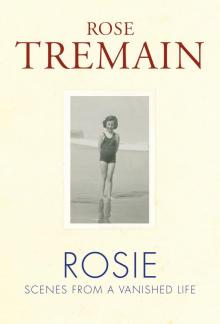 Rosie
Rosie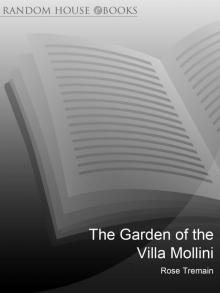 The Garden of the Villa Mollini
The Garden of the Villa Mollini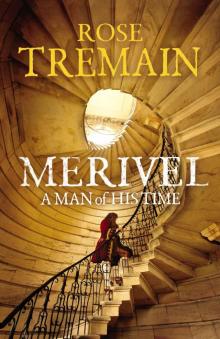 Merivel: A Man of His Time
Merivel: A Man of His Time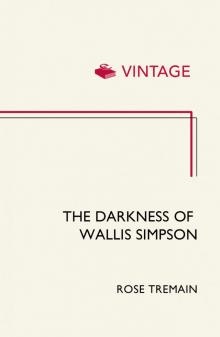 The Darkness of Wallis Simpson
The Darkness of Wallis Simpson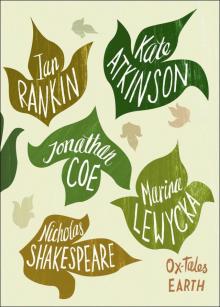 Earth
Earth Sacred Country
Sacred Country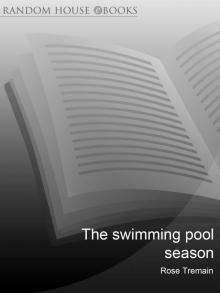 The Swimming Pool Season
The Swimming Pool Season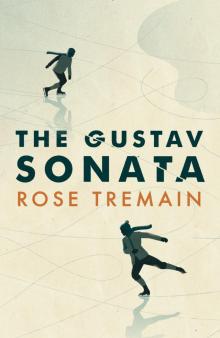 The Gustav Sonata
The Gustav Sonata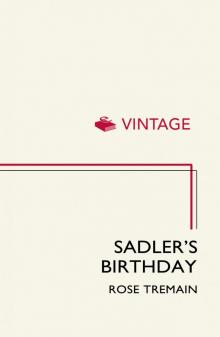 Sadler's Birthday
Sadler's Birthday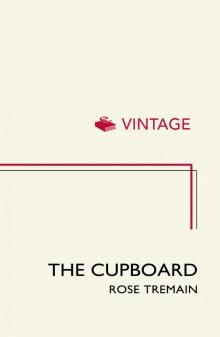 The Cupboard
The Cupboard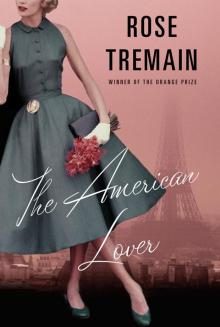 The American Lover
The American Lover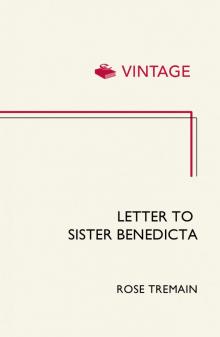 Letter to Sister Benedicta
Letter to Sister Benedicta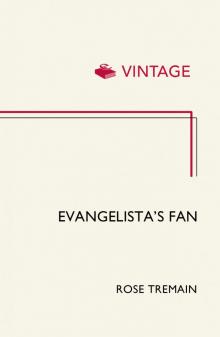 Evangelista's Fan
Evangelista's Fan Restoration
Restoration The Road Home
The Road Home The Colonel's Daughter
The Colonel's Daughter The Way I Found Her
The Way I Found Her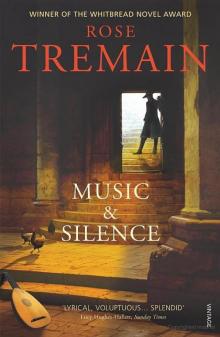 Music & Silence
Music & Silence